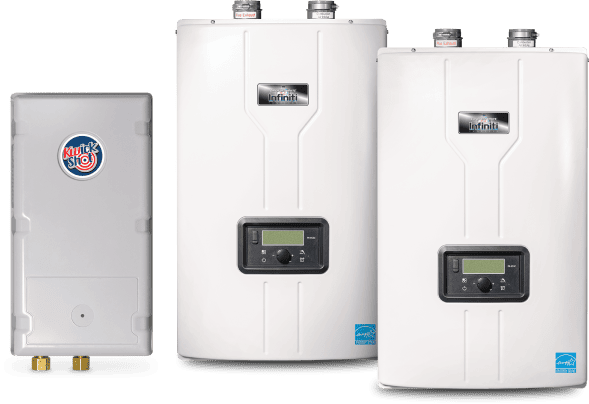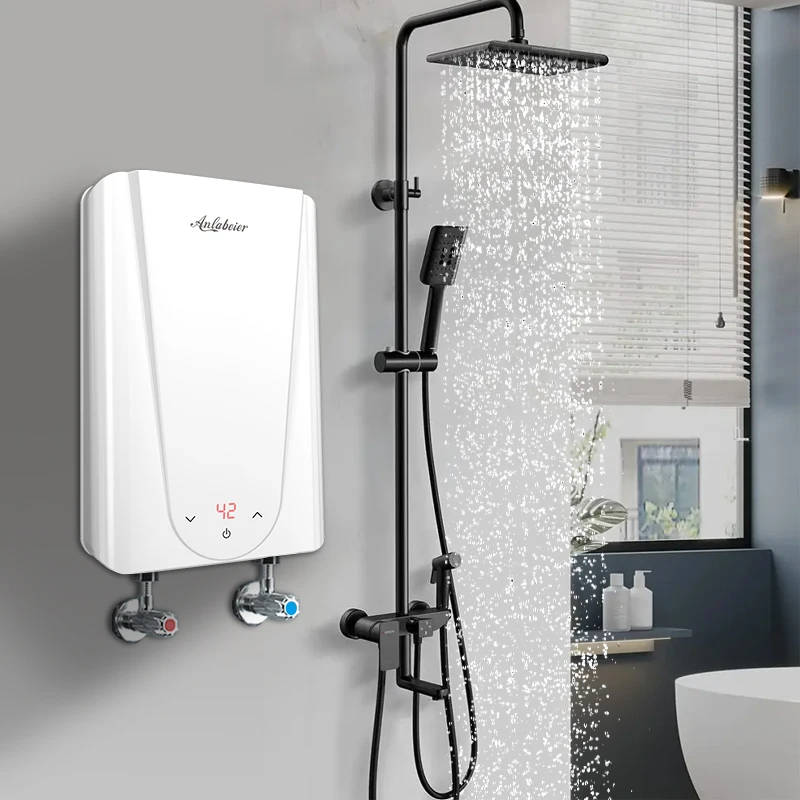Boosting Home Comfort: The Benefits Of Tankless Water Heaters
Boosting Home Comfort: The Benefits Of Tankless Water Heaters
Blog Article
We've encountered the article on Unveiling the Hot Trend: The Benefits of Tankless Water below on the net and accepted it made sense to relate it with you on this page.

In a globe where benefit and effectiveness preponderate, it's no surprise that property owners are constantly looking for smarter methods to handle their home's energy consumption and comfort. One advancement that has actually progressively acquired popularity is the tankless water heater. However exactly what makes these systems attract attention from the traditional tank-based models a lot of us grew up with? Let's dive in and discover the advantages of tankless hot water heater, helping you determine if it's time to make the button in your home.
Intro
Image this: you step into the shower after a lengthy day, expecting a comforting waterfall of hot water, only to be welcomed by icy droplets due to the fact that the last person utilized all of it up. Sound acquainted? Traditional hot water heater keep a fixed quantity of hot water, meaning you're at the mercy of that tank's supply. Tankless systems, on the other hand, warmth water as needed. No more going out mid-shower, no more fumbling with routines simply to make certain hot water is offered.
Recognizing Tankless Hot Water Heater
What Are Tankless Water Heaters?
Tankless water heaters, often referred to as on-demand or immediate water heaters, give hot water just as it's required. As opposed to storing gallons of pre-heated water, these devices kick into action the minute you switch on the faucet. Water travels through a heat exchanger, warming up in real-time, suggesting you get a continuous flow of warm water without the demand for a big container resting lazily by.
Exactly how Do They Differ from Traditional Equipments?
Conventional heating units hold a reservoir of hot water, using energy to keep that container at a consistent temperature. Tankless units remove the standing supply, reducing thrown away energy and the bulky footprint of a large cylinder. Essentially, you're upgrading from a "stockpile" way of thinking to a "made-to-order" strategy.
Common Sorts Of Tankless Units
Tankless hot water heater usually are available in 2 varieties: gas and electrical. Gas designs tend to deliver higher circulation prices, ideal for larger houses, while electric designs typically serve smaller homes and are commonly simpler to mount. Furthermore, some systems are created for point-of-use (offering one fixture) while others can manage the whole home's warm water demands.
Key Advantages of Tankless Hot Water Heater
1. Limitless Hot Water Supply
Ever before needed to set up showers so everyone obtains their fair share of hot water? With tankless, that ends up being a distant memory. As long as the heating system's circulation capacity isn't exceeded, you can take back-to-back showers without becoming a popsicle.
2. Power Effectiveness and Expense Savings
No more heating up a giant tank's well worth of water and keeping it warm all the time. Tankless heaters lower standby power losses, which can lower energy costs. While the initial expense could be higher, the long-lasting financial savings usually warrant the investment.
3. Space-Saving Design
If your home is short on storage, removing the bulky storage tank maximizes beneficial room. Tankless systems are small and can typically be installed on walls, hidden in corners, or set up in limited energy wardrobes without gobbling up the whole area.
4. Longer Lifespan
A properly maintained tankless water heater can outlast its tank-based relative. Traditional tanks might last 10-15 years, while tankless versions can maintain chugging along for two decades or even more, making them a solid financial investment gradually.
5. Improved Water Quality
Storing water in a tank can occasionally result in debris buildup or a slightly "off" taste. With tankless systems, fresh water is warmed on the spot, decreasing the possibilities of sediment buildup and potentially using cleaner-tasting water.
Factors to consider Prior To Changing
Though the benefits are engaging, it's wise to take into consideration a few elements prior to fully committing.
Preliminary Investment Prices
Tankless heating systems generally come with a higher upfront price tag. In between the device itself and possible installation adjustments, the first cost might provide you sticker shock. But keep in mind to view it as a long-lasting investment.
Installation Demands
Depending on your home's framework, you might need extra electrical ability or gas line upgrades. Ensure you comprehend the setup needs and seek advice from a professional to avoid surprises.
Evaluating Your Home's Water Usage Patterns
If your house concurrently utilizes several components with high hot water demand, ensure the device's flow price meets your needs. Knowing your usage patterns helps you select the ideal dimension and sort of tankless heating system.
Upkeep and Treatment Tips
Tankless systems are reasonably low maintenance, yet they aren't set-it-and-forget-it devices.
Regular Cleansing and Descaling
Difficult water minerals can build up in the warmth exchanger, affecting performance. Routine descaling (frequently advised yearly) keeps the unit going for peak performance.
Annual Specialist Assessments
A yearly checkup from an expert guarantees small issues are caught early. They'll examine the unit's performance, try to find leakages, and help preserve ideal performance.
Making Certain Appropriate Ventilation
For gas designs, correct air flow is essential to safely expel exhaust gases. Ensure venting systems are clean and properly set up to avoid any type of prospective safety risks.
Comparing Different Brands and Models
Not all tankless hot water heater are produced equal.
Investigating Trusted Suppliers
Seek reputable brand names with a background of creating top quality units. A reliable maker commonly offers far better customer assistance and longer guarantees.
Reviewing Reviews and Individual Feedback
Individual evaluations and comments from neighbors or friends that have actually gone tankless can offer useful understandings. In some cases, real-life experiences can be a lot more informing than advertising and marketing brochures.
Installation: DIY or Expert?
While some home owners relish tackling jobs themselves, tankless setup may not be the very best time to break out the toolbox.
Advantages and disadvantages of DIY Setup
A DIY install can conserve cash, but it features risks. Inaccurate installment can lead to inadequacy or security problems. If you come in handy and have experience, it may be practical-- yet wage caution.
When to Call a Professional Plumbing Technician
For the majority of, calling a professional makes certain every little thing's done properly. An expert plumbing technician recognizes neighborhood codes, sizing requirements, and airing vent specifications, lowering the risk of problems.
Making best use of Effectiveness
You've bought a tankless unit-- currently maximize its effectiveness.
Ideal Temperature Settings
Most people set their systems in between 120-140 F. Readjusting the temperature level can improve comfort and financial savings. Experiment to find a wonderful spot that doesn't waste power.
Pairing with Low-Flow Fixtures
Intend to stretch your system's capacities? Consider setting up low-flow showerheads and faucets. They minimize water use, permitting your tankless system to deliver a stable stream of hot water without straining.
Environmental Effect
Tankless water heaters straighten with greener living objectives.
Decreased Carbon Footprint
By utilizing much less power and just home heating water as needed, tankless systems can lower your home's carbon impact, reducing your ecological influence.
Conserving Natural Resources
Much less power consumption and less lost warm water convert into fewer natural resources being made use of, an environmental win-win.
Who Benefits Most from Tankless Heaters?
The charm of tankless heating units is that they can fit a range of families.
Big Families vs. Solitary Passengers
Huge households may love the endless warm water supply, while single owners appreciate the power financial savings from not heating up a whole storage tank for just one person's morning shower.
House Owners with Restricted Space
If your home is short on square video footage, losing the cumbersome tank maximizes room for other fundamentals-- or perhaps simply a lot more breathing space.
Eco-Conscious Customers
Going tankless aligns with environmentally friendly values, ensuring you're not squandering energy or sources.
Future Trends in Tankless Water Heaters
The world of home devices is ever-evolving, and tankless hot water heater are no exception.
Smart Home Assimilation
Imagine adjusting your water heater's temperature level through an application or obtaining maintenance signals on your phone. As clever home tech advances, we'll see even more connection and comfort.
Improvements in Technology
R&D is continuously enhancing heat exchangers, making units a lot more effective and long lasting. Future versions could be even quieter, extra portable, and better fit for differing climates.
Final thought
Selecting a tankless water heater is greater than simply upgrading your home's warm water system; it's buying long-term convenience, energy effectiveness, and a greener way of living. By considering your home's water use, being mindful of installment needs, and dedicating to regular upkeep, you can appreciate a constant stream of warm water without the luggage of a bulky tank. As technology advances, you can anticipate even smarter, more efficient tankless services that not just make your life easier yet likewise benefit the earth.
Six Benefits of a Tankless Hot Water Heater
Continuous hot water. Large families know what a pain it is to hop into the shower and get blasted with cold water. With a tankless hot water heater, this doesn't happen as long as you install the right size tank. Even if you don t have a large family, a tankless hot water heater allows you to use multiple appliances at once without running out of hot water. Reduced energy bill. Because tankless heaters are essentially "off" when the water tap is not on, they use less energy overall. In fact, an ENERGY STAR-qualified tankless hot water heater can use 25-40% less energy than a conventional water heater, and save the average family $100 or more annually. Longer life. Get more bang for your buck with a greater lifespan. Specifically, conventional hot water heaters last about 10-13 years compared with up to 20 years for a tankless hot water heater. Less space. Did you know that tankless hot water heaters can be hung on a wall almost anywhere in your home? Plus, at 28" tall by 20" wide and 10" deep, a tankless hot water heater takes up a lot less space than a conventional hot water heater, which is 60" tall and 24" wide. Good for the environment. In addition to reducing the amount of energy used, most propane-fired tankless water heaters are made of recycled materials. Many conventional tanks, on the other hand, go directly to the dump once they've served their purpose. High safety ratings. Conventional water heaters are "always on" and thus pose safety risks more often than do tankless heaters, which only operate when warm water is needed. https://www.rotorooter.com/blog/water-heaters/six-benefits-of-a-tankless-hot-water-heater/

I was made aware of that report on Why You Should Consider a Tankless Water Heater through a pal on a different domain. Appreciated our posting? Please quickly share it. Help someone else check it out. I recognize the value of your readership.
Call Today Report this page